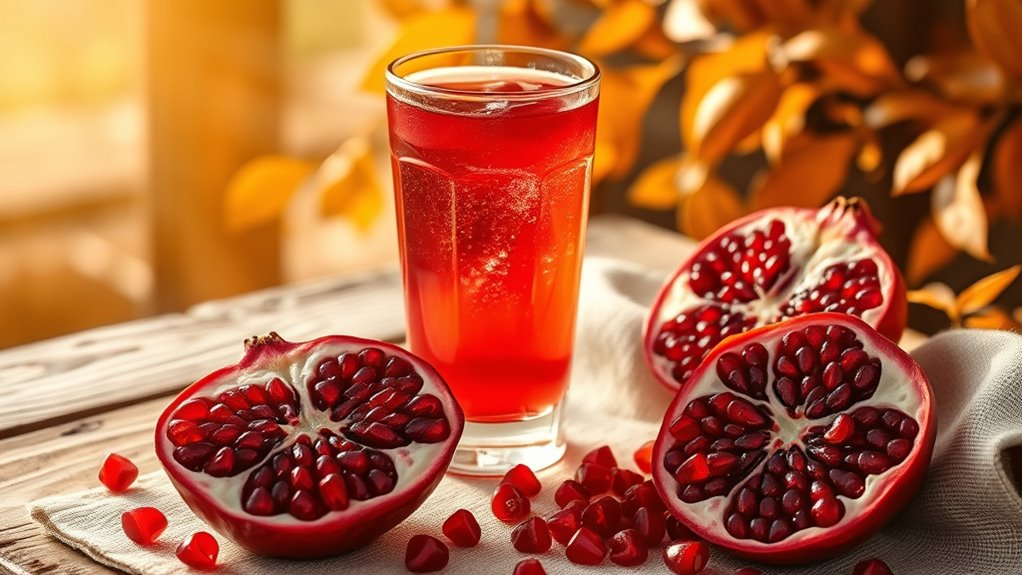In fall, enjoying pomegranate juice helps you boost your antioxidant intake thanks to its rich polyphenol content, including ellagic acid and flavonoids like anthocyanins. These compounds protect your cells from oxidative stress, lower inflammation, and support heart and immune health. Proper storage and minimal processing preserve these benefits, making fresh, cold-pressed juice your best choice. Keep exploring to discover how to maximize your polyphenol intake and enjoy seasonal wellness benefits.
Key Takeaways
- Pomegranate juice is rich in polyphenols like ellagic acid, punicalagins, and flavonoids, offering potent antioxidant benefits.
- Proper storage and cold-pressing processing maximize polyphenol stability and health-promoting properties.
- Polyphenols provide antioxidant, anti-inflammatory, and cardiovascular protective effects, supporting overall health during fall.
- Seasonal harvesting enhances polyphenol content, with peak ripeness boosting antioxidant synergy in fall.
- Incorporate fresh, minimally processed pomegranate juice into daily routines for immune and cognitive support during autumn.
The Different Types of Polyphenols in Pomegranate Juice
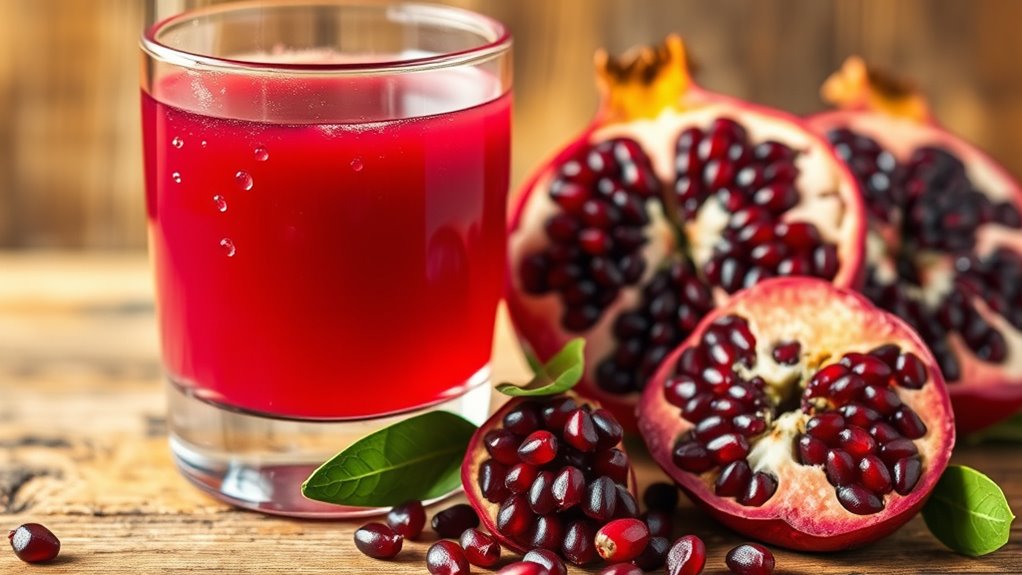
Have you ever wondered what makes pomegranate juice so rich in beneficial compounds? The answer lies in its diverse polyphenol content. During pomegranate cultivation, the fruit develops various polyphenols, which are then extracted through specialized polyphenol extraction processes. These polyphenols include ellagic acid, punicalagins, and flavonoids like catechins and anthocyanins. Each type offers unique health benefits and contributes to the juice’s vibrant color and flavor. Ellagic acid provides antioxidant properties, while punicalagins are known for their potent bioactivity. Flavonoids add to the overall polyphenol profile, enhancing the juice’s nutritional value. Polyphenol composition varies depending on factors like harvest time and processing methods, further influencing the health benefits of pomegranate juice. Additionally, polyphenol diversity in pomegranate juice is crucial for its antioxidant capacity, supporting your overall health. The variety of polyphenols found in pomegranate juice can also work synergistically to amplify their health-promoting effects. Understanding these different polyphenols helps you appreciate how pomegranate juice can support your health through its rich, natural compounds. A comprehensive understanding of polyphenol stability during storage and processing can help maximize their health benefits. Furthermore, agricultural practices such as soil health and irrigation significantly impact the polyphenol levels in the fruit, influencing the final nutritional content.
How Polyphenols Contribute to Antioxidant Defense
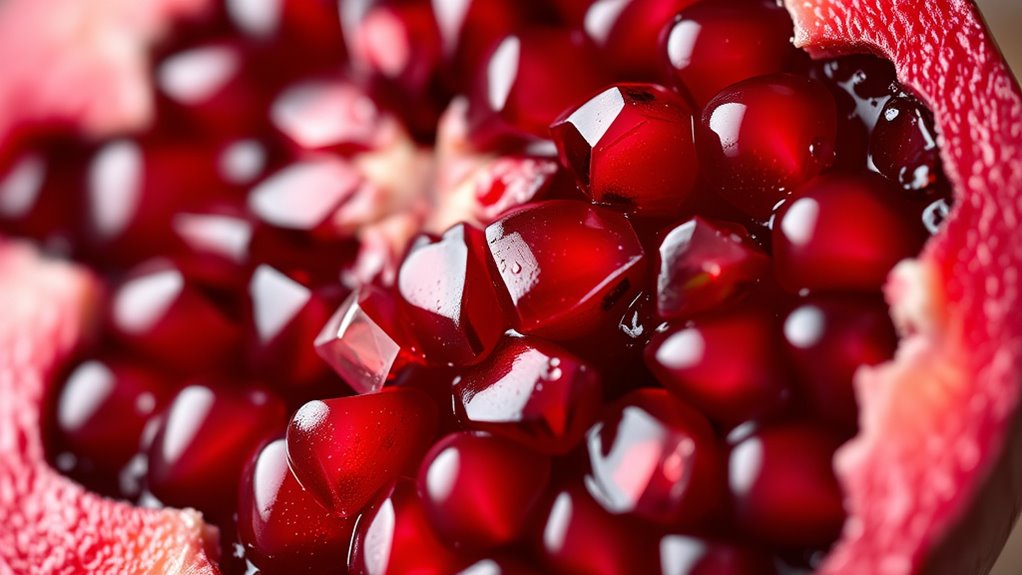
Polyphenols play a crucial role in protecting your body from oxidative stress by acting as powerful antioxidants. When you consume pomegranate juice, polyphenol absorption occurs efficiently, allowing these compounds to enter your bloodstream and reach your cells. Once inside, polyphenols activate antioxidant pathways, neutralizing harmful free radicals that can damage DNA, proteins, and lipids. This process helps reduce inflammation and supports overall cell health. Your body’s natural defense system relies on these polyphenols to bolster its antioxidant capacity, especially during times of increased oxidative stress, such as seasonal changes in fall. Additionally, forsale 100 options make it easier to incorporate pomegranate juice into your daily routine. Incorporating a variety of polyphenol-rich foods can further enhance your body’s antioxidant defenses and promote long-term health. Understanding the bioavailability of polyphenols can help maximize their health benefits through proper intake and preparation methods. Research also indicates that processing methods can influence the stability and effectiveness of polyphenols in beverages like pomegranate juice. Exploring food matrix interactions can provide deeper insights into how different components affect polyphenol absorption and efficacy.
The Role of Ellagic Acid and Flavonoids in Pomegranate
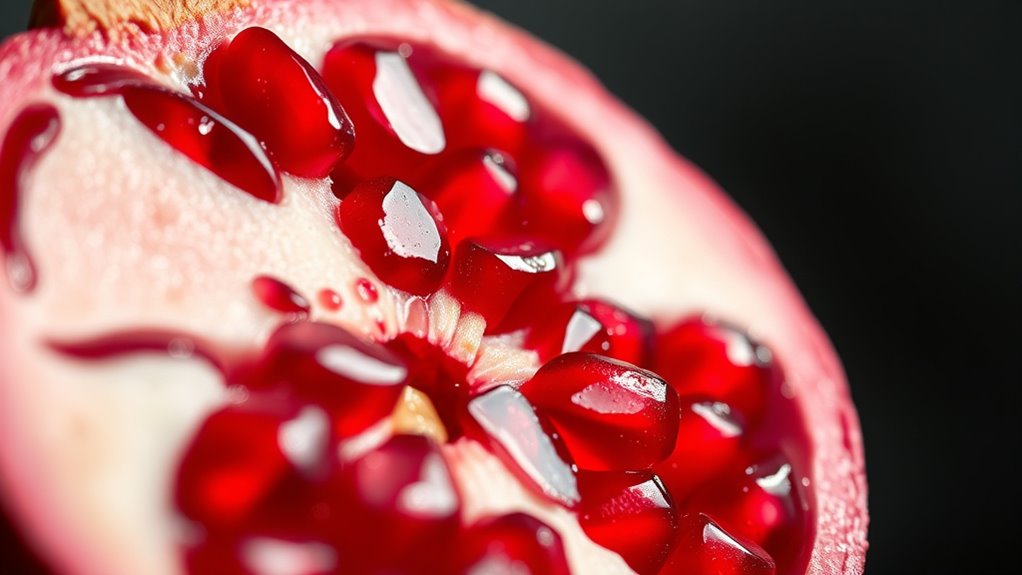
Ellagic acid plays a key role in supporting your body’s defense against oxidative stress, offering notable health benefits. Flavonoids act as powerful antioxidants, helping to neutralize harmful free radicals. Together, these compounds work synergistically in pomegranate juice, amplifying its overall protective effects.
Ellagic Acid Benefits
Did you know that ellagic acid and flavonoids in pomegranate juice work together to promote health? These compounds boost your immune system, fight inflammation, and may reduce cancer risk. During pomegranate cultivation, growers optimize conditions for maximum ellagic acid extraction, enhancing its benefits. This synergistic effect is a testament to the importance of compound interactions in natural health products. This powerful antioxidant supports heart health and protects cells from damage, making it an important component of skincare. Additionally, research into AI in Education suggests that integrating innovative technologies can further improve health education and awareness campaigns about superfoods like pomegranate. Understanding the biosynthesis process of these compounds can lead to better cultivation techniques to maximize their health effects. Moreover, understanding the natural production of ellagic acid can help improve extraction methods for higher potency.
Flavonoids as Antioxidants
Flavonoids, another key group of polyphenols found in pomegranate juice, work alongside ellagic acid to provide powerful antioxidant effects. They combat oxidative stress through multiple antioxidant mechanisms, including scavenging free radicals and inhibiting oxidative enzymes. This contributes to overall cellular protection and reduces inflammation. The flavonoid diversity in pomegranate, from anthocyanins to flavonols, enhances these effects because different flavonoids target various oxidative pathways. Their combined activity supports cardiovascular health, immune function, and skin integrity. By working synergistically with ellagic acid, flavonoids strengthen the overall antioxidant capacity of pomegranate juice. This multifaceted approach makes pomegranate a rich source of natural antioxidants, helping you combat oxidative damage and promote long-term health. Additionally, the presence of diverse flavonoids can influence tuning of biological responses, further amplifying their protective effects. Moreover, research indicates that the bioavailability of flavonoids plays a crucial role in their effectiveness, highlighting the importance of consuming whole pomegranate juice for maximum benefits. Studies also suggest that metabolic pathways involved in flavonoid processing may affect how these compounds exert their benefits within the body.
Synergistic Effects in Juice
When you consume pomegranate juice, the combined action of ellagic acid and flavonoids creates a powerful antioxidant synergy. This synergy enhances the health benefits beyond what each compound offers alone. The pomegranate flavor, rich and slightly tart, complements this natural boost, making each sip more enjoyable. During the fall season, seasonal availability guarantees you get the freshest juice, maximizing polyphenol content. The interaction between ellagic acid and flavonoids amplifies their ability to neutralize free radicals, supporting your immune system and reducing oxidative stress. This collaborative effect showcases how the complex polyphenol profile in pomegranate juice works together, providing superior antioxidant protection. Additionally, the presence of headphone jacks in modern devices can influence how you listen to your favorite content, ensuring optimal audio quality while enjoying your healthful drink. Embracing seasonal availability means you enjoy the full health potential of this vibrant, flavorful fruit.
Comparing Pomegranate Juice to Other Fruit Beverages
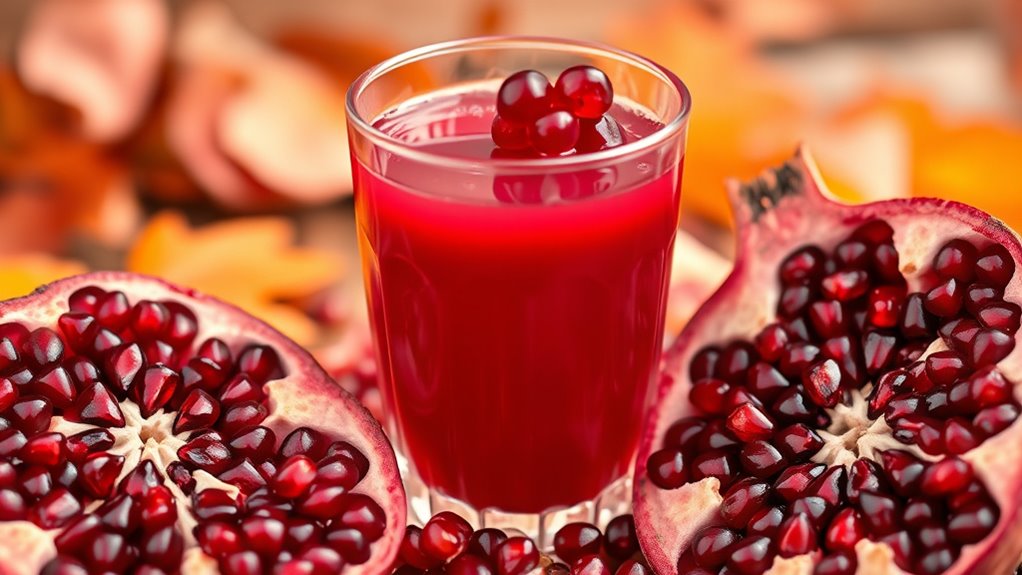
Compared to other fruit beverages, pomegranate juice stands out for its high concentration of polyphenols, which are potent antioxidants. Its rich pomegranate flavor results from careful juice processing that preserves these beneficial compounds. While many fruit drinks contain vitamins, few match pomegranate’s polyphenol levels, making it a superior choice for antioxidant intake. To illustrate, consider the following comparison:
| Beverage | Polyphenol Content | Notable Features |
|---|---|---|
| Pomegranate Juice | High | Strong antioxidant properties |
| Cranberry Juice | Moderate | Known for urinary health |
| Apple Juice | Low | Widely consumed, less polyphenols |
This table highlights pomegranate juice’s unique position among fruit beverages, emphasizing its potent health benefits. Additionally, proper storage in a cool, dark place can help preserve the polyphenol content of pomegranate juice, ensuring maximum health benefits. Maintaining optimal storage conditions can significantly impact the nutritional quality, including polyphenol levels, over time. Furthermore, processing methods play a crucial role in retaining these antioxidants during production. Enhancing processing techniques can further improve the retention of polyphenols and other beneficial nutrients.
Potential Health Benefits of Pomegranate Polyphenols
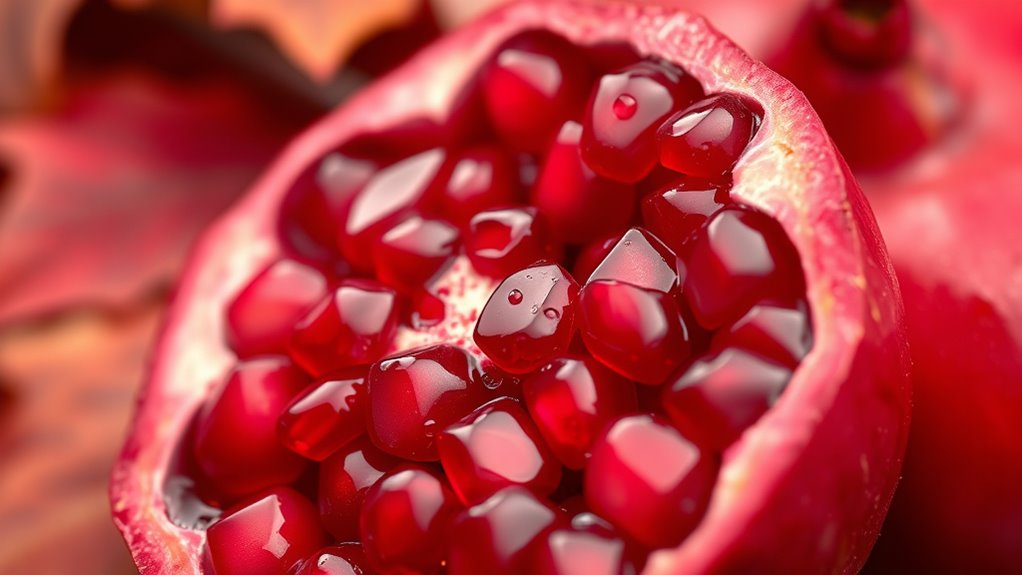
The high polyphenol content in pomegranate juice offers a range of significant health benefits. These antioxidants help combat oxidative stress, reducing your risk of chronic diseases like heart disease and certain cancers. Pomegranate cultivation, especially when combined with seasonal harvesting, guarantees you receive fresh, nutrient-dense juice packed with polyphenols. Regular consumption may improve your heart health by lowering blood pressure and cholesterol levels. The anti-inflammatory properties support your immune system and overall vitality. Additionally, polyphenols can enhance cognitive function and protect against age-related decline. By choosing pomegranate juice from well-managed cultivation and harvest practices, you maximize these health advantages. Incorporating pomegranate into your diet during the fall season can be a delicious way to boost your wellbeing naturally.
Tips for Maximizing Polyphenol Intake During Fall

To get the most polyphenols this fall, start by choosing fresh pomegranates when they’re in season. Incorporate pomegranate juice into your daily routine to boost your intake easily. These simple steps help you enjoy the health benefits of polyphenols year-round.
Choose Fresh Pomegranates
During fall, selecting the freshest pomegranates is key to maximizing your polyphenol intake. Focus on pomegranate cultivation practices that guarantee ripe, high-quality fruit. Look for seasonal harvesting signs like deep color, heavy weight, and intact skin. Choose fruits that feel firm but yield slightly under gentle pressure. Avoid pomegranates with cracks, soft spots, or blemishes, as these can indicate overripe or compromised fruit. When shopping at local markets or stores, ask about recent harvest dates to ensure you’re getting freshly picked produce. The timing of seasonal harvesting directly affects polyphenol levels, so fresh, properly harvested pomegranates will provide the most health benefits. Picking the right fruit means you’ll enjoy richer flavor and a higher concentration of antioxidants.
Incorporate Juice Daily
Incorporating pomegranate juice into your daily routine is an easy way to boost your polyphenol intake during fall. To maximize benefits, choose juices made from high-quality pomegranates, which start with proper pomegranate cultivation to ensure rich polyphenol content. Look for juices that use minimal processing and avoid added sugars. Understanding juice extraction methods can help you select products that retain more antioxidants; cold-pressing or gentle pressing preserves polyphenols better than heat-intensive methods. Drinking a glass of fresh, pure pomegranate juice each day helps you harness its health benefits, especially during the fall season when immune support is essential. Incorporate it into smoothies, morning routines, or as a revitalizing beverage to stay consistent and maximize your polyphenol intake year-round.
Incorporating Pomegranate Juice Into Your Autumn Wellness Routine
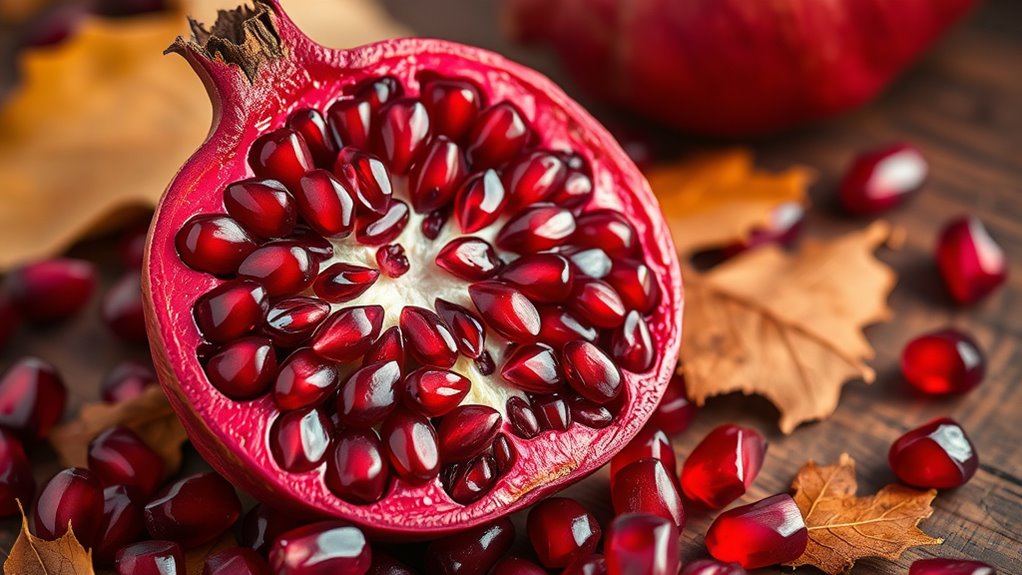
As the crisp air of autumn settles in, adding pomegranate juice to your daily routine is a simple way to boost your wellness. Start by choosing high-quality juice made from carefully harvested pomegranates, reflecting the dedication of pomegranate farming. Freshly pressed juice retains more polyphenols, maximizing health benefits. You can incorporate it into your mornings by mixing it into smoothies or pouring it over oatmeal. During juice processing, minimal heat helps preserve nutrients, so look for cold-pressed options. Enjoy a glass of pomegranate juice as a invigorating, antioxidant-rich beverage that supports your immune system and overall health. Making it part of your autumn routine is easy and flavorful, helping you stay energized and healthy throughout the season.
Frequently Asked Questions
Are There Any Risks Associated With High Polyphenol Consumption From Pomegranate Juice?
If you’re worried about high polyphenol intake from pomegranate juice, be aware of potential toxicity and allergic reactions. Excessive consumption might cause stomach upset or interact with medications. Some individuals could experience allergic responses like itching or swelling. To stay safe, enjoy pomegranate juice in moderation, especially if you have allergies or health conditions. Always consult your healthcare provider if you’re uncertain about how much is safe for you.
How Does Pomegranate Polyphenol Content Vary by Juice Brand or Preparation Method?
You might notice that pomegranate juice brands and preparation methods affect polyphenol content. Juice processing techniques, like pasteurization or filtration, can reduce polyphenol levels, while minimal processing helps preserve them. To maximize benefits, choose brands that use cold-pressed or minimally processed methods, and look for labels indicating high polyphenol preservation. Your selection impacts the antioxidant richness and potential health benefits of your pomegranate juice.
Can Pomegranate Polyphenols Help With Seasonal Allergy Symptoms?
You might wonder if pomegranate polyphenols can help with seasonal allergy symptoms. While they aren’t a cure, these compounds can support your immune system and provide some allergy relief by reducing inflammation. Drinking pomegranate juice regularly may boost your immune support, potentially easing allergy symptoms. However, it’s best to combine this with other allergy management strategies and consult your healthcare provider for personalized advice.
Are There Specific Pomegranate Varieties Richer in Polyphenols?
Imagine choosing a ripe fruit from a lush orchard—certain pomegranate cultivars stand out with richer polyphenol concentration, much like selecting the juiciest, most vibrant fruit. Some varieties, like ‘Wonderful’ or ‘Angel Red,’ are known for higher polyphenol levels. You can maximize benefits by opting for these cultivars, as their unique genetic makeup boosts polyphenol content, offering you more antioxidants and health perks in every sip.
How Do Pomegranate Polyphenols Interact With Common Medications?
You should know that pomegranate polyphenols can interact with certain medications by affecting drug interactions and medication absorption. These compounds may inhibit enzymes or transporters involved in drug metabolism, potentially increasing or decreasing medication effectiveness. It’s wise to consult your healthcare provider before adding pomegranate juice to your routine, especially if you’re on blood thinners or other critical medications, to avoid unintended effects on your treatment.
Conclusion
As fall arrives, enjoying a glass of pomegranate juice can boost your antioxidant intake markedly—studies show it contains over 100 different polyphenols. These compounds support your immune system and protect your cells from damage. By incorporating pomegranate juice into your autumn routine, you’re not only savoring a delicious beverage but also investing in your health. So, make it a habit this season and reap the many benefits of this vibrant, nutrient-rich fruit.
Susannah expertise lies in researching and compiling evidence-based content on juicing, nutrition, and overall health. She is committed to ensuring that The Juicery World offers accurate, up-to-date, and trustworthy information to empower readers to take control of their health. Susannah’s goal is to inspire individuals to embrace juicing as a way to nourish their bodies and live their best lives.

